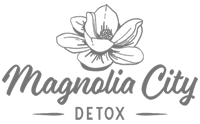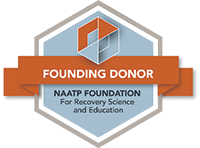Generally, individuals don’t ponder many risks when sick and need an over-the-counter medication to treat their cold or flu. Most over-the-counter medications are safe when used as directed. However, engaging in cold medicine and alcohol is a formula for a disaster.
Why Do People Use DayQuil?
DayQuil is a common over-the-counter medication that assists in alleviating cold and flu symptoms. DayQuil is a cough suppressant, fever reducer, and decongestant.
It treats the following:
- Sore throat
- Headache
- Sneezing
- Mild aches/pains
- Cough accompanied by the cold or flu
However, like other medications, DayQuil has ingredients that can interfere with various other substances, such as alcohol. Even though DayQuil comes in numerous formulas, several drugs contain dextromethorphan and acetaminophen.
Neither ingredients are safe to use with alcohol. Therefore confirms the debate of if alcohol and DayQuil can work well together. If an individual has alcohol use disorder (AUD) or alcohol addiction, it’s safe to avoid medications that can contain acetaminophen and dextromethorphan.
What Is in DayQuil?
Dextromethorphan
This ingredient in DayQuil is one of the well-known ingredients in cough medicines. Dextromethorphan is a cough suppressant and sedative deprived of the same chemical family as morphine.
In recommended doses, it can numb the senses and throat. However, it can act as an all-powerful and dissociative hallucinogenic agent when used in excess.
Phenylephrine
This ingredient is a decongestant and is used as a nasal spray. Studies have indicated that oral intake of phenylephrine has reduced efficiency.
Acetaminophen
Acetaminophen acts as a moderate fever reducer and pain reliever. It is also known as Paracetamol.
Can You Drink Alcohol While Taking DayQuil?
According to the DayQuil manufacturer, Procter & Gamble, they caution that the safest choice is not drinking at all while engaging in DayQuil. Especially if you typically drink regularly and heavily. Acetaminophen and alcohol can cause serious side effects such as:
- Yellowing of the skin and whites of the eyes
- Excessive weakness or tiredness
- Unusual bruising or bleeding
- Nausea and vomiting
- Joint pain or swelling
- Loss of appetite
- Fever
- Chills
Can You Drink Alcohol While Taking DayQuil?
DayQuil’s effects can approximately last 4 to 6 hours, depending on how an individual is feeling. However, it is not recommended to mix cold medicine and alcohol but a person can have a drink 4 to 6 hours after their last dose.
On the contrary, a single drink of alcohol can last in a person’s body for up to 3 hours. Therefore, it’s ideal not to use DayQuil after a drink. The period varies from person to person.
Can You Take Cold Medicine and Alcohol?
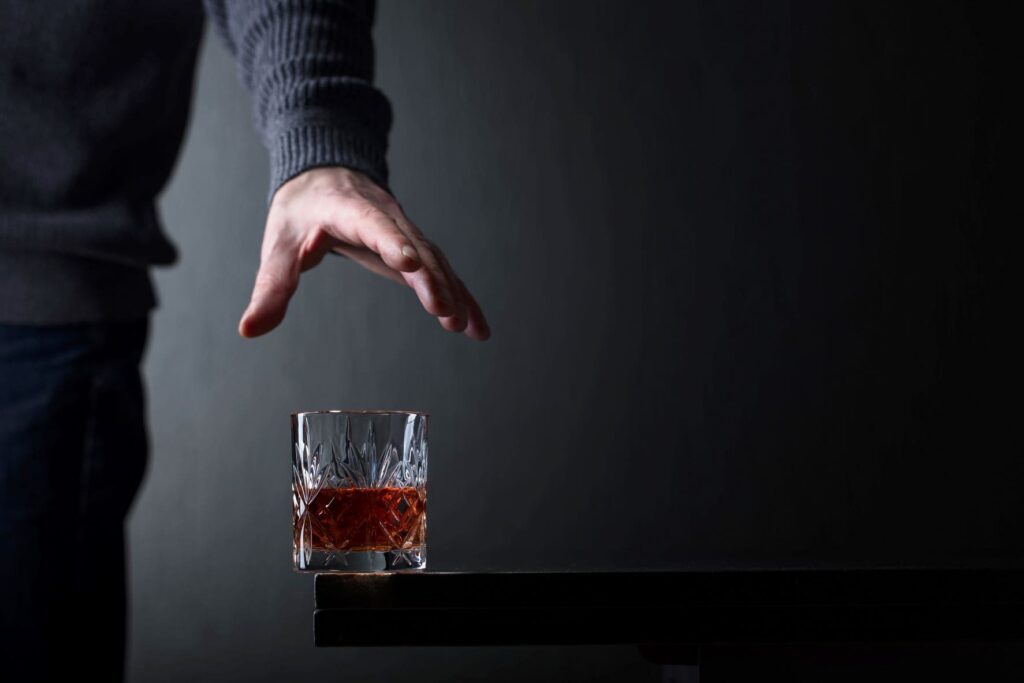 It’s recommended that an individual avoids drinking alcohol while taking cold medicine. Alcohol and DayQuil have sedative priorities that can result in serious medical injury including long-lasting liver damage. Furthermore, alcohol subdues a person’s immune system, which results in lengthened severe cold and flu symptoms.
It’s recommended that an individual avoids drinking alcohol while taking cold medicine. Alcohol and DayQuil have sedative priorities that can result in serious medical injury including long-lasting liver damage. Furthermore, alcohol subdues a person’s immune system, which results in lengthened severe cold and flu symptoms.
The most common side effects of alcohol and engaging in cold medications are dizziness and drowsiness. When the two substances are combined, the effect is increased, and focus and judgment are impaired.
The risks that are associated with drowsiness caused by cold medicine and alcohol are serious. For this reason, it’s implied to never operate heavy machinery or drive while under the influence of a substance.
There lies a problem with combining alcohol and DayQuil. When a person mixes cold medicine and alcohol, it increases the chances of the following developing:
- Nausea and vomiting
- Liver damage
- Drowsiness
- Dizziness
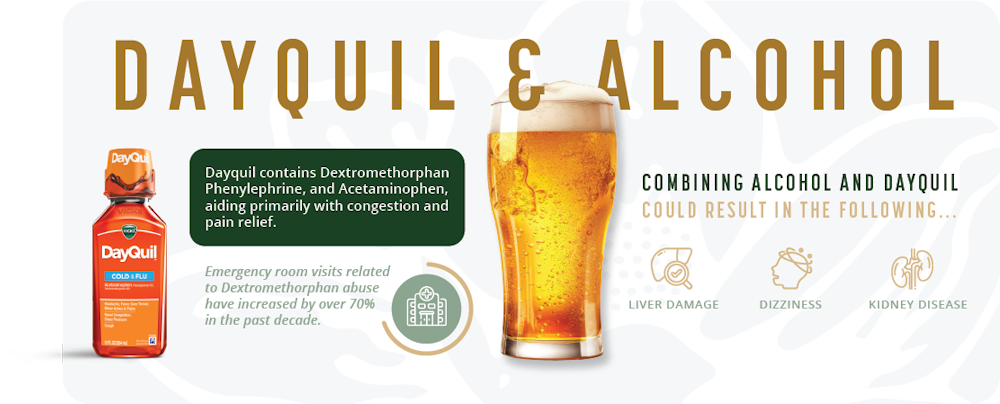 Acetaminophen and Liver Damage
Acetaminophen and Liver Damage
Acetaminophen is in stores under the brand name Tylenol. It is the most common drug ingredient in the United States. It is found in over 600 medications, which include various popular over-the-counter medications. Even though acetaminophen is an effective fever reducer and pain reliever, it can also be toxic to your liver.
The leading cause of acute liver failure in the United States is acetaminophen overdose. It is the second leading cause of liver failure that requires transplantation. When an individual takes acetaminophen or medications and drinks alcohol, there is an increased risk of liver damage.
How Does Liver Damage Occur?
There is a risk in taking acetaminophen or mixing alcohol-related to how the body breaks down acetaminophen. When it’s processed by the liver, acetaminophen is broken down into several substances. Most of the substances are removed in the person’s urine.
One of the substances is known as NAPQI and it’s heavy on the liver.
The symptoms of liver damage include:
- Jaundice (which is whites of the eyes or yellowing of the skin)
- Abdominal pain on the upper right side
- Nausea or vomiting
- Abdominal swelling
- Loss of appetite
- Tiredness
- Sweating
Fortunately, when acetaminophen is taken in safe doses, the body can deal with the dangerous effects of NAPQI. An all-powerful antioxidant named glutathione that the liver uses to neutralize NAPQI and prevent it from harming liver cells.
However, when individuals drink heavily (3 or more drinks per day), it causes glutathione levels to drop. This allows NAPQI to build up to harmful levels that can damage liver cells.
Due to this, chronic drinkers are more at risk of unintended acetaminophen overdose, which can result in liver failure or liver damage.
Symptoms of Acetaminophen Overdose
- Yellowing of the skin or eyes
- Loss of appetite
- Abdominal pain
- Convulsions
- Sweating
- Vomiting
- Diarrhea
- Fatigue
- Nausea
- Coma
The DMX Effect
Dextromethorphan, or DMX, is the ingredient in DayQuil that assists in suppressing coughing and is unsafe when combined with alcohol. The side effects can include:
- Problems concentrating
- Nausea and vomiting
- Lightheadedness
- Drowsiness
- Dizziness
Plus, alcohol can make an individual’s side effects even worse. Some individuals also experience impairment in judgment and thinking. For this reason, don’t engage in activities requiring mental alertness, like operating hazardous machinery or driving.
Unfortunately, the abuse of DMX products is a common issue among teens in the U.S who engage in an excessive amount of the drug for the psychoactive effects. Some of the terms for the practice include “skittling” or “robotripping.”
When an individual engages in more than the recommended dose of DMX, it can cause:
- Auditory or visual hallucinations
- Loss of coordination
- High blood pressure
- Slurred speech
- Skittishness
- Sweating
- Lethargy
- Euphoria
When an individual adds alcohol to DMX products, it can also increase the risk of liver damage. High doses mixed with alcohol result in the person experiencing a stupor, shallow breathing, or a coma that can lead to death.
Symptoms of DMX Overdose
- Breathing problems (labored and slow breathing, shallow breathing)
- Rapid heartbeat, pounding heart
- Intestinal and stomach spasms
- Higher body temperature
- Unsteady walking
- Hallucinations
- Constipation
- Drowsiness
- Seizures
- Coma
The abuse of DMX by teens is a huge problem in some states, such as Florida. The state of Florida has banned children under 18 from buying over-the-counter medications that contain dextromethorphan.
NyQuil, a cold and flu medication similar to DayQuil, is meant for nighttime use. It has similar risks to DayQuil, and more due to the additional ingredients.
When a person considers the risks to their health, it’s ideal don’t drink alcohol while taking DayQuil. Contrarily, if you have an alcohol use disorder and can’t stop drinking, it’s safer to skip DayQuil and power through your flu or cold instead.
Is Mixing Cold Medicine and Alcohol a Sign of Alcoholism?
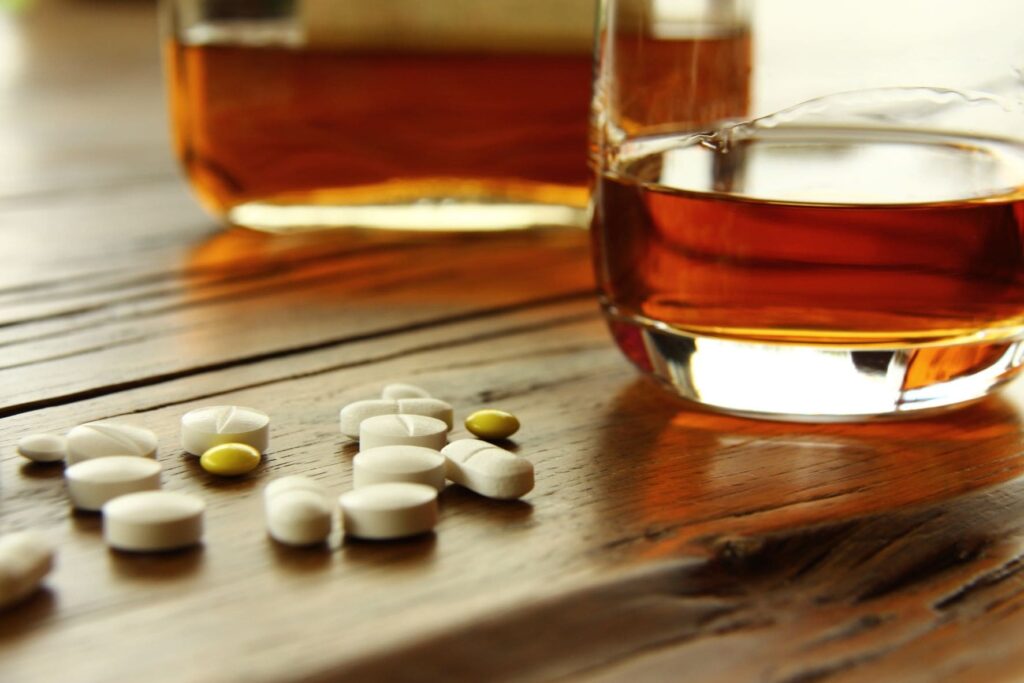 It can be. A person who abuses DayQuil to get high is known as “robotripping”; it’s escalated by adding alcohol to the experience. Some individuals use dextromethorphan throughout their day to maintain a constant high.
It can be. A person who abuses DayQuil to get high is known as “robotripping”; it’s escalated by adding alcohol to the experience. Some individuals use dextromethorphan throughout their day to maintain a constant high.
Individuals that engage in that have developed a tolerance, including a psychological or physical dependence on DMX. Even though DMX is non-addictive, it isn’t safe when used excessively. If you or someone you know is struggling to quit dextromethorphan, help is needed.
The withdrawal symptoms from DMX aren’t deadly, but they can be very uncomfortable.
- Vomiting and diarrhea
- Bone or muscle aches
- Restlessness
- Cold flashes
- Insomnia
Alcohol
Additionally, alcohol can be very potent. When a person struggles with AUD, a detox is needed. The withdrawal process from alcohol can be painful and even deadly.
Withdrawal symptoms include:
- Delusions and hallucinations
- Delirium Tremens (DTs)
- Nausea and vomiting
- Extreme sweating
- Shaking hands
- Headache
- Seizures
- Anxiety
- Fear
Is It Safe to Use Any Medications With Alcohol?
Hundreds of over-the-counter and prescription medications aren’t safe to take while consuming alcohol. The risks of mixing alcohol with medications range from increased side effects to life-threatening symptoms such as overdose or death.
Cough Suppressants
Similar to cold remedies, combining alcohol with medications designed to treat a cough can cause:
- Loss of motor skills
- Drowsiness
- Dizziness
The effects of this mixture can be serious and deadly when the medication contains alcohol.
Diabetes Medications
If you have diabetes, drinking alcohol can affect blood sugar levels. Drinking alcohol while taking diabetic medications can have a similar effect. It can cause the following symptoms:
- Sudden blood pressure changes
- Rapid heartbeat
- Headache
- Vomiting
- Nausea
Treatment for AUD
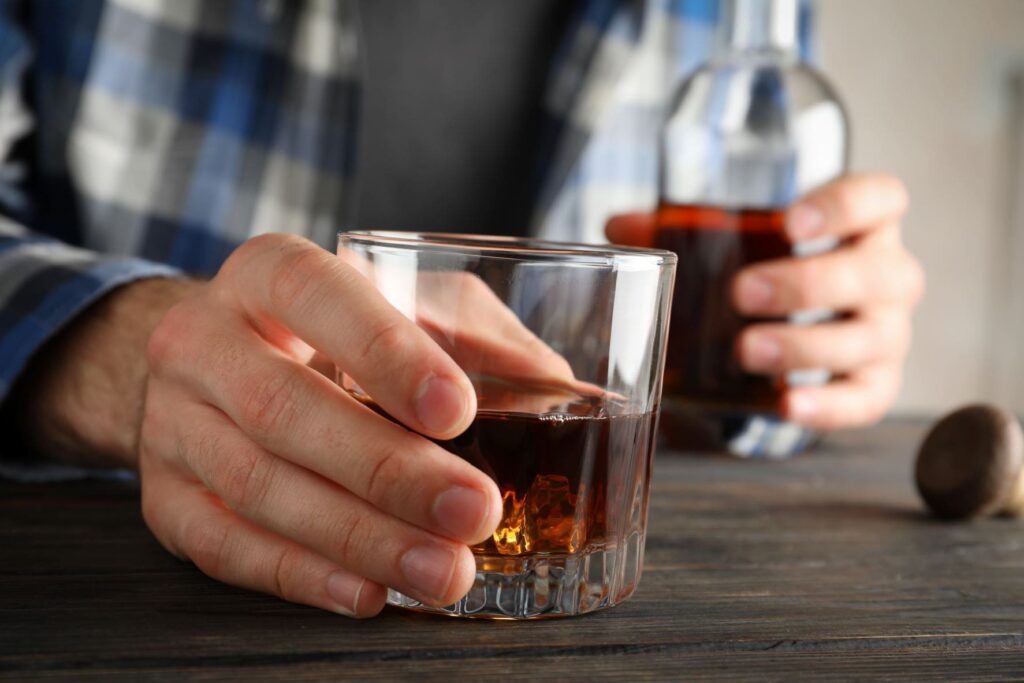 We begin our treatment process with the first step of detox. Detox is a medically supervised process that assists patients in withdrawing from substances such as alcohol. It allows the nurses and doctors to monitor vital signs, hydration levels, and several other factors that suggest withdrawal symptoms.
We begin our treatment process with the first step of detox. Detox is a medically supervised process that assists patients in withdrawing from substances such as alcohol. It allows the nurses and doctors to monitor vital signs, hydration levels, and several other factors that suggest withdrawal symptoms.
The detox process is challenging and can even be life-threatening. At Magnolia City Detox, our alcohol detox program in Houston assists patients in discovering the needed space to begin the healing process. Once you arrive here, we’ll ask about your medical history. Our stabilization program will then help you transition to residential treatment once you successfully complete detox.
From there, we’ll conduct a physical examination that will help us determine if any present conditions can interfere with treatment. After this step, we’ll administer a drug test. After that step, we’ll discuss your goals with you.
During the detox process, our medical staff will monitor your alcohol withdrawal symptoms continually and might give you medications to alleviate them if needed. After your body’s cleansed of alcohol, you will move into a rehab center. Treatment and counseling await here.
The Benefit of Treatment for Alcohol
When you enter a rehab center such as ours, you’ll be around individuals who share similar experiences. Once you meet those also struggling with addiction, you’ll feel less alone. The interactions grant the opportunities to connect with like-minded individuals who have been down similar paths.
It’ll be easier to gain more insight into your issue by listening to the stories of your peers. Once you’re able to share, you’ll be able to recognize the root cause behind your addiction. Our trained experts will provide guidance and counsel.
Coping strategies are crucial to handling anxiety, stress, and tools to help prevent relapse. With healthy habits such as exercising regularly, sleeping well, and eating healthy, energy will arrive and less stress.
The counselors will assist the patients in setting goals and creating a solid plan for attaining them. They will make sure you understand the importance of activities vital to recovery. Lastly, they’ll show you how to implement more positive behaviors into your life.
Alcohol Detox Awaits at Magnolia City Recovery Today
Addiction can wreak havoc on your life if you let it have all control. Mixing alcohol and DayQuil is a recipe for disaster, and it stems from having an alcohol use disorder. Recovery isn’t a one-size-fits-all approach and requires a change to enhance a lifestyle.
We understand the withdrawal process is uncomfortable. Our staff provides around-the-clock monitoring and care. There are also medications to help ease the pain and withdrawal discomfort.
Also, we understand that each patient has unique needs. Our staff is diligent in making sure whoever attends here, feels cared for and comfortable. Learn more about our admissions process.
https://medlineplus.gov/ency/article/002628.htm
https://dailymed.nlm.nih.gov/dailymed/drugInfo.cfm?setid=10ae1774-6e64-4b75-941b-8facd63a66e8


